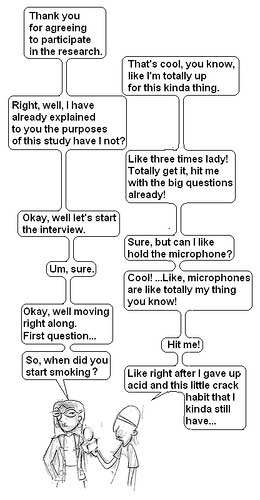Human Research Ethics Online Training
IV. Ethics Controversies: Case Studies
Case Study 4: Gang Leader for a Day
Although this case study is social-science research based, there are aspects which may relate to observational research in the oral health area especially with regard to confidentiality and becoming aware of criminal activity through research.
When Sudhir Venkatesh was a first-year PhD student in sociology, he decided to do research on the urban poor in government-subsidized housing projects not far from the University of Chicago. So one day he went into one of the housing project's high rise buildings with a clipboard and a questionnaire on poverty and started climbing the stairs. When he got to the fifth floor, he was stopped by the local gang that was hanging out in the stairwell. They held him hostage overnight in the urine-soaked stairwell.
At first they thought he might be part of a rival gang. When he explained about his research project, they were sceptical and decided to hold him until their boss arrived. Sometime in the early hours of the morning, the gang leader, J.T. showed up, and they started talking about Venkatesh's research. By the time the sun came up, J.T. decided to let Venkatesh go. Surprisingly, he also invited him to come back and "hang out" to get to know the lives of the urban poor better than he ever could from a multiple-choice survey.
That was the beginning of nearly a decade of ethnographic research with a crack-dealing gang in the Chicago housing projects. Venkatesh, now a sociology professor at Columbia University in New York, wrote about his experience in a book called "Gang Leader for a Day."
 Photo copyright Ry Pepper.
Photo copyright Ry Pepper.
That experience offered Venkatesh incredible insights into the economics and social rules of an urban U.S. gang, a subculture that very few social scientists have ever had access to. But it also pointed to the ethically troubling aspects of his research. Venkatesh was regularly exposed to the gang's criminal activities, including not only the day-to-day aspects of selling crack cocaine, but even, occasionally, the planning of drive-by shootings.
When social scientists uncover crime through their research
This put him in terribly risky legal situations (and at the time, he did not even realize just how risky they were). Different countries have different laws about the reporting obligations of those who observe criminal activity, but in many places, citizens have an obligation to report a serious crime being planned. Also, unlike lawyers, doctors, dentists and clergy members (and, in some U.S. states, journalists), there is no researcher-client confidentiality law protecting social science researchers. In other words, social scientists usually are not legally protected if they wish to protect their informants by refusing to cooperate with the police who are investigating criminal activity.
Venkatesh was a graduate student and he hadn't been properly trained in these aspects of research ethics (he was doing his research at a time when social science researchers usually did not have to get ethics approval before doing research). When his professors found out more about what kind of things he was encountering during his research, they warned him that if he didn't report a drive-by shooting that he knew was being planned and someone died in that shooting, he could be charged as an accessory to murder.
 Copyright Niccolò Bazzani (juliusfrumble)
Copyright Niccolò Bazzani (juliusfrumble)
No confidentiality for research participants when crime occurs
Further, the fact that there was no law protecting social scientists from having to testify if they witnessed criminal activity meant that if the police questioned Venkatesh, he might be forced to either turn over his notebooks with all his field notes or else go to jail himself. If he was accused of participating in a crime, his records could be subpoenaed. In other words, there was no way he could assure his research participants of confidentiality.
This is a serious consideration in social science research, even when the research isn't as dramatic as Venkatesh's research on crack-selling gangs who planned drive-by shootings. Sometimes a researcher isn't planning on conducting research on criminal activity, but it comes up in conversations on other subjects. For example, say you are doing research on cigarette smoking, but as you talk to the smokers, they start telling you about the illicit drugs they use.
What do you do?
The answer is not simple. In the example above, for example, it can depend on whether the drug use occurred in the past or in the present, whether it is personal drug use or if it also involves dealing drugs, and also whether minors are involved.
For these reasons, it is impossible to provide blanket guidelines. Probably the first thing you should do is stop the research and get the advice of your research supervisor, who may in turn need to consult with a legal expert and/or your local ethics supervisory board.
What do you do when your research uncovers illegal activity?
If you are doing research and you discover illegal activity, you should consult someone who can advise you on how to balance your obligation to provide confidentiality to your research participants with your reporting responsibilities under the law.
You can imagine this as a continuum. At one end is a situation where you may have a legal or moral obligation to provide information to the police in order to "prevent or lessen a serious and imminent threat to the life or health of the individual concerned or another person." [1] (Hearing people plan a drive-by shooting definitely falls in this category.) In Australia, certain kinds of crime have mandatory reporting requirements, including crimes against minors and persons who are mentally ill or intellectually impaired.
At the other end of the continuum, if you uncover a minor crime that has no external victim (such as personal drug use), then your chief obligation is to protect the confidentiality of your informant. This means thinking carefully about whether your informants can be identified from your research field notes. Remember that your research records may be subject to subpoena, freedom of information request or mandated reporting. Your participants should be advised of this before consenting. If the research involves the investigation of illegal behaviour, it is often recommended that the identities of the participants remain anonymous in all research records.
For more information on Professor Sudhir Venkatesh's research: http://sudhirvenkatesh.org or his Columbia University faculty page http://www.sociology.columbia.edu/fac-bios/venkatesh/faculty.html
Sudhir Venkatesh discusses these ethical conundrums in his riveting book, 'Gang Leader for a Day'
That book is written for a more popular audience, but Professor Venkatesh has also published a number of academic articles and books on his research, including:
- American Project: The Rise and Fall of a Modern Ghetto. Harvard University Press, 2000
- Off the Books: The Underground Economy of the Urban Poor. Harvard University Press, 2006
- Venkatesh's work has also been featured in Freakonomics by Steven Levitt and Stephen Dubner, in a chapter he co-wrote with Levitt called "Why Do Drug Dealers Still Live With Their Moms?".
He is a guest blogger for the NY Times "Freakonomics" blog. http://freakonomics.blogs.nytimes.com/tag/sudhir-venkatesh/
[1] National Health and Medical Research Council, http://www.nhmrc.gov.au/publications/synopses/e72syn.htm
 Cartoon by Paul Mason. Copyright Creative Commons, some rights reserved.
Cartoon by Paul Mason. Copyright Creative Commons, some rights reserved.

